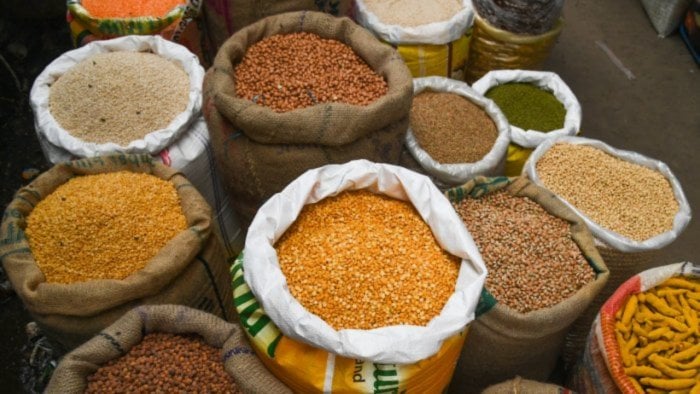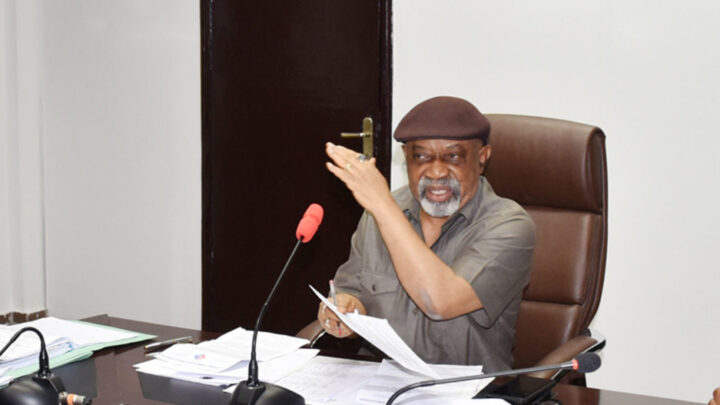As 2022 draws the curtain to usher in a new year, it is essential to examine some of the reports released by the National Bureau of Statistics (NBS) that captured Nigeria’s economic trajectory in 2022.
Some of the reports showed that Nigeria was on the right direction track to economic development, while others point to the opposite.
TheCable takes a look at some of the reports released by the NBS in 2022.
THE MULTIDIMENSIONAL POVERTY INDEX
Advertisement
The NBS released its National Multidimensional Poverty Index Report within the year, which showed that 133 million Nigerians are multidimensionally poor.
According to Oxford Poverty and Human Development Initiative, multidimensional poverty encompasses deprivations experienced by poor people — such as poor health, lack of education, inadequate living standards, and living in environmentally hazardous areas.
In 2019, the United Nations Development Programme (UNDP) reported that slightly over 98 million Nigerians are living in multidimensional poverty.
Advertisement

This means, over 35 million Nigerians have slipped into multidimensional poverty in three years.
The NBS report said 65 percent of all the poor people in Nigeria are in the north, meaning that 86.5 million out of the 133 million citizens that are multidimensionally poor, are from the said region.
“Overall, 65 percent of poor people — 86 million people — live in the north, while 35 percent — nearly 47 million — live in the south,” the report reads.
Advertisement
The report further said the north-west has the highest number of poor people in Nigeria, pegged at 45.5 million residents, followed by the north-east and north-central with 20.5 million and 20.2 million poor people, respectively.
The south-south has a total of 19.7 million poor people living in the zone, according the report. This is followed by the south-west and south-east with 16.3 million and 10.9 million poor people, respectively.
21.47 PERCENT NOVEMBER INFLATION RATE — THE 10TH CONSECUTIVE INCREASE IN 2022
NBS announced that the consumer price index (CPI), which measures the rate of change in prices of goods and services, surged to 21.47 percent in November 2022, an uptick from 15.60 percent in January of the same year.
Advertisement
The November report showed that it was the 10th consecutive increase in inflation the year has seen.
In January, the inflation figure stood at 15.60 percent and in February it increased to 15.70 percent. March and April saw 15.92 percent and 16.82 percent increases, respectively.
Advertisement
In May, June and July, the figure stood at 17.71 percent, 18.60 percent and 19.64 percent; while in August, September, October and November, the figures were 20.52 percent, 20.77 percent, 21.09 percent, and 21.47 percent, respectively.

Advertisement
This also means that the headline inflation rate rose higher in November 2022 compared to the same month in the previous year. NBS attributed the increase to the surge in demand usually experienced during the festive season.
It also listed other likely factors responsible for the surge to include a hike in the cost of importation due to the persistent currency depreciation and general increase in the cost of production.
Advertisement
The report also said food inflation rose to 24.13 percent in the month under review, an uptick compared to the 23.72 percent recorded in the preceding month.
The rise in the food index, NBS said, was caused by increases in prices of bread and cereals, food products, potatoes, yam and other tubers, oil and fat.
NIGERIA’S ECONOMIC GROWTH SLOWS TO 2.5 PERCENT ON LOW OIL PRODUCTION
In 2022 so far, the NBS has released its gross domestic product (GDP) report for three quarters. In the latest third quarter (Q3) report, published in November, Nigeria’s GDP grew by 2.25 percent (year-on-year) in Q3 2022.
NBS attributed the slow growth to the base effects of the recession and the challenging economic conditions that have impeded productive activities and the country’s low oil production, as output slumped to 1.20 million barrels per day.
In Q2, the expansion in the non-oil sector pushed the country’s GDP to 3.54 percent, NBS said.
According to the data, the development was an improvement from 3.11 percent growth recorded in the first quarter (Q1) of the year.
On a year-on-year basis, NBS said the Q2 result decreased 1.47 percent points from the 5.01 percent growth rate recorded in the corresponding quarter in 2021.
The International Monetary Fund (IMF), in its World Economic Outlook (WEO) for July 2022, retained a projected economic growth of 3.4 percent for Nigeria in 2022.
Later in October, the organisation downgraded the nation’s growth rate to 3.2 percent, saying that economic activities would slow down in Nigeria and across the world as nations use fiscal and monetary instruments to tame rising food prices.
N3.4 TRILLION TRADE SURPLUS RECORDED IN NINE MONTHS
But despite the downgrade, the foreign trade in goods statistics released by the statistics organisation showed that Nigeria recorded a N3.4 trillion trade surplus in nine months — between January and September of 2022.
In the nine months under review (Q1, Q2, and Q3), Nigeria’s total exports stood at N20.4 trillion and total imports was N17 trillion, which gives a trade surplus of N3.4 trillion.
A trade surplus is an economic indicator of a positive trade balance in which the exports of a nation outweigh its imports.

Analysis of the NBS data, showed that in Q1 2022, the total trade stood at N13 trillion. This was higher than the value recorded in the fourth quarter of 2021 (N11.7 trillion) and the value recorded in the corresponding period of 2020, which stood at N7.69 trillion.
In Q2, the country’s total trade stood at N12.1 trillion, lower than the figure recorded in Q1 2022. Similarly, in Q3, Nigeria recorded N11.6 trillion in foreign trade transactions.
“In the third quarter of 2022, total trade stood at N11,597.93 billion; this was lower than the value recorded in the second quarter of 2022 (N12,841.54 billion) but was higher than the value recorded in the corresponding period of 2021, which stood at N10,472.42 billion,” the NBS statement reads.
“Total exports stood at N5,933.63 billion of which re-exports were N25.04 billion, while total imports stood at N5,664.30 billion.”
Experts, therefore, advised that Nigerian needs to embrace and sustain non-oil exports as it is critical in growing the economy, providing more jobs, and addressing insecurity in the country.







